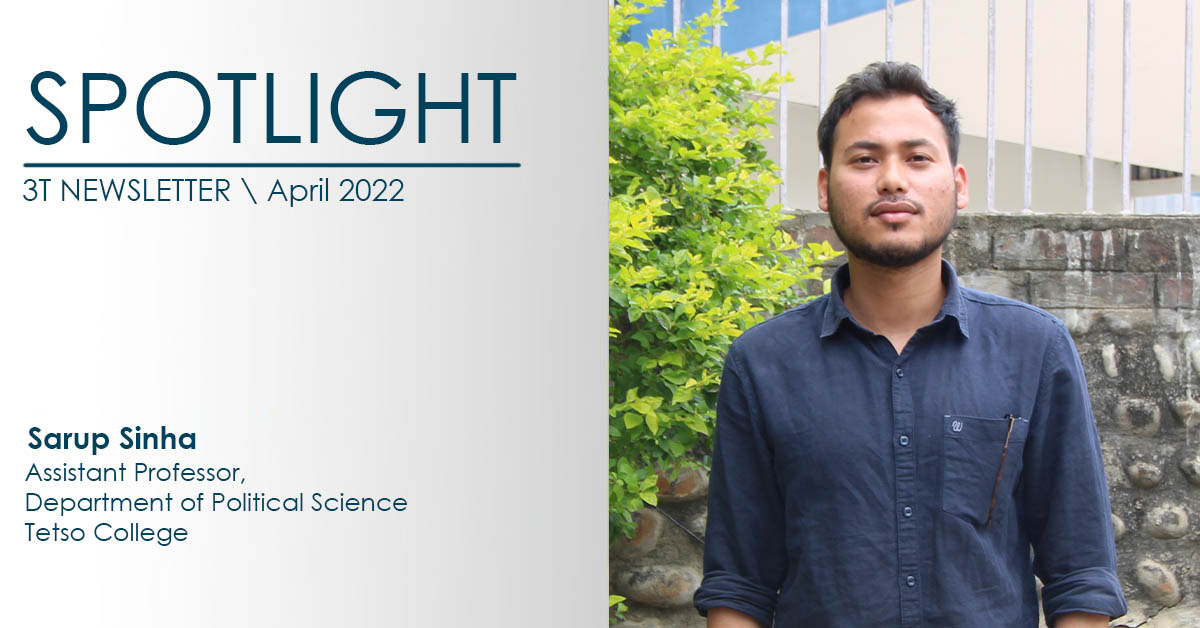3T: Kindly introduce yourself and tell us how it was like growing up.
Sarup: Hi, my name is Sarup Sinha. I am an Assistant Professor of Political Science at Tetso College, Dimapur, and I am pursuing my PhD at North-Eastern Hill University, Shillong. Besides teaching and doing a PhD, I dabble in independent research every once in a while, which allows my academic self to rendezvous with my journalistic self, however amateurish the result.
I spent my early childhood in Mhow, a cantonment town in Madhya Pradesh known for its infantry training, where my father had been posted at the time of my birth. After that, we moved to Ranchi and then to Shillong: the city where I finished my schooling, where my father retired; the place that gave me my share of adolescent memories, ones we all like to hold ever so fondly. When asked about their childhood, most army kids credit their early exposure to diverse milieux as the reason for their being adaptable or resilient. I would like to add that, somewhere amidst the delight and pain of experiencing change, I realized that I tend to develop a particular affinity with places. By ‘places’ I mean its entire gamut of material and immaterial, human and non-human constituents. Things both beautiful and vile. So, growing up was also an exercise in self-exploration, I would say. I suspect the term ‘self-exploration’ might have given off a false impression, so let me clarify that the so-called self-exploration led me to discover my own ignorance more than anything else.
3T: What inspired you to be a teacher? And why did you choose Political Science? How rewarding is teaching a subject that you are passionate about?
Sarup: The ideal answer should sound something like “I always wanted to be a teacher”, or “I felt this was my calling”, or that “I was drawn to the profession…”, so forth and so on. But that is not quite the case here. I feel that we often find ourselves at certain points in life, and then add explanations, details and justifications retrospectively. In other words, we often rationalise our decisions after having taken them. A similar feeling strikes me as I am trying to answer this question. Whatever I say would be just that – yet another rationalisation. However, by way of answer, let me tell you that I teach because I find teaching meaningful. Teaching and research are probably the only two vocations through which I see myself capable of making any contribution, however small, to those around me and beyond.
Moving on to my academic domain, it was somewhere around the end of my Masters’ when I decided to do a PhD that I began to give serious thought to the choice of discipline. Because I have an interdisciplinary background, the decision was quite a difficult one to make as I liked certain aspects of every discipline. In the end, I decided to choose Political Science because, besides loving the subject, I felt that it gave me the most comprehensive lens to address the issues I wanted to through my research.
And yes, teaching your favourite subject allows you to structure your thoughts better, clarify your concepts, and doing so regularly by interacting with students is indeed a rewarding experience. Teaching, after all, is also learning.
3T: What is a typical day like in your life?
Sarup: Ok, so here’s a snapshot: I usually dedicate the early morning hours to preparing for my classes. Then I leave for college, where I take classes, interact with the wonderful students, chat with my equally wonderful colleagues over coffee and so on. In the evening, I usually go out to eat and, in doing so, I get what many of us like to call “the me-time”. Once I return to my room, the time spent after that to the time before I retire to bed goes into reading and, on certain blessed days, writing. There you have it: my humdrum, colourless routine.
3T: Suppose you win a lottery ticket and end up winning 10 million rupees. What would you do with the money?
Sarup: Get myself treated for the heart attack I would get after winning that amount.
All right, jokes aside, I would like to build a shelter home for homeless people and, if possible, start a scholarship for the underprivileged children too. I do realise that to continue what I just mentioned on a long-term basis, I would’ve to earmark a certain amount for investments, too. Now, in case I put you off by sounding too philanthropic, let me also add that I would love to take my family on an international tour.
3T: What is the best and worst part about your job?
Sarup: The little ways in which the students and I make mutual impressions on our lives almost every day is perhaps the best part of my job. On the downside, the feeling of guilt on days when you feel like you have underperformed in your role as a teacher is probably the worst part.
3T: Is there any raging societal issue that you would want to be solved at the earliest? Why and how does it disturb you?
Sarup: What could be a bigger social malaise than the fact that the majority of people still live in abject poverty, and most of us are simply immune to their tormenting existence. I don’t know what is more tragic: that the poor have become invisible or that we continue to believe the myth, almost with a convenient complacency, that poverty is an inevitable fact of life and not something man-made.
3T: How would you describe yourself in 5 words?
Sarup: How I wish I could.
[Ok, here is an untidy approximation: Mediocre, Curious, Autodidact, Adaptable and Wannabe- Polymath.]
3T: Vocational education and recreational activities along with quality education are so important for the all-round development of a student. Do you think that the educational institutions in Nagaland are putting in enough effort to cater the needs of students?
Sarup: We must acknowledge that the education system in India needs a thorough overhaul. The challenges are not only local but systemic. Although the quality of education in Nagaland has improved, there is, however, much to be done when it comes to introducing vocational activities into the curriculum. Many skillful Naga youth could benefit from vocational training amid rising unemployment. Further, colleges like Tetso have made good headway in keeping up with the latest educational tools. Similar interventions are desirable in other colleges, too.
3T: What is your greatest strength and weakness?
Sarup: In all honesty, I’m very mediocre in every respect, and I certainly do not possess anything in the name of talent. Perhaps in partial recognition of this fact, I try to educate myself more about the world around me. This desire to keep learning has gradually become my greatest strength.
I’m sure there are many weaknesses, but my occasional casualness towards those dear to me is the one I can recall at the moment.
3T: Can you tell us your hobbies? What would the students be surprised to find out about you?
Sarup: I wish I had something interesting to say here. But, unfortunately, I don’t.
I like music. I love reading (both fiction and non-fiction). Needless to say, a large part of who I am and how I see the world is the product of my reading. I like journalling as well, though I’m still struggling to build it into a habit. I also love watching and discussing movies. Oh, I like to play table tennis, not that I’m good at it. I’m also a big fan of Mixed Martial Arts, and to a lesser extent, Boxing.
3T: Have you ever wished to meet any fictional character in real life? What character is that?
Sarup: Well, that would be ‘God’. Perhaps no other figure, real or imaginary, evokes the amount of passion and enjoys the level of fixation that God does.
3T: Describe the next five years of your life, and your plans.
Sarup: I want to continue teaching. In addition, I would like to carry out independent research, explore different avenues and write about all kinds of stuff in general.







